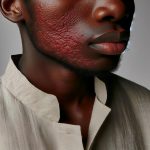I've noticed a lot of chatter lately about whether rayon is itchy, and honestly, it's a valid concern. It turns out, the itchiness some folks experience might be due to the chemicals used in making rayon. I've had my fair share of annoying itches from different fabrics, so I get why this is a big deal. If you've ever slipped into a rayon shirt only to find yourself scratching like crazy, you're not alone. But before you swear off rayon for good, there's more to the story that could change how you view this common fabric. Let's peel back the layers and see what's really going on.
Table of Contents
Key Takeaways
- Rayon can trigger itchiness due to chemicals used during its production.
- Symptoms of rayon sensitivity include redness, itching, and hives.
- Washing rayon garments before use can reduce skin reactions.
- Natural fibers like cotton, silk, and linen may be better for sensitive skin.
- Patch testing can confirm if you have a sensitivity to rayon.
Understanding Rayon Allergy
Getting to grips with rayon allergy, it's key to note that this fabric can be a real itch trigger for some folks. We're not just talking about a minor annoyance here. For anyone with sensitive skin, eczema, or contact dermatitis, rayon's not always the cozy companion it's made out to be. The real culprits? The chemicals used in rayon production. These sneaky substances can kick off some pretty gnarly skin reactions, from redness and itching all the way to hives.
Now, if you're thinking, 'Is my skin throwing a fit because of rayon?' a patch test with a dermatologist might just be your best bet. This isn't about playing guessing games. A patch test can straight-up confirm if rayon's the troublemaker. Trust me, knowing for sure can make all the difference in managing those annoying skin flares.
Symptoms of Rayon Sensitivity
So, you're wondering about the signs of rayon sensitivity, huh?
Let's chat about how it can make your skin go bananas with itchiness, redness, and even hives.
And we'll also touch on why some folks might start sneezing or have a hard time catching their breath when they're around rayon.
Common Itchiness Signs
Experiencing itchiness from rayon often comes with telltale signs like skin redness and hives, especially if you've got sensitive skin or conditions like eczema. It's all about your skin reacting to the chemicals used in rayon's production. Sometimes, it's just a slight annoyance, but other times, it can be downright uncomfortable.
| Sign | Explanation |
|---|---|
| Redness | Your skin might look more flushed or irritated. |
| Itching | That urge to scratch is a classic sign. |
| Hives | Raised, itchy welts signaling a reaction. |
| Sneezing/Breathing Issues | Not as common, but it's a sign your body's not a fan. |
If you're nodding along to these, it might be time to chat with a doc about your sensitivity to rayon.
Skin Reactions Overview
If you've ever felt itchy or noticed red spots after wearing rayon, you're not alone; these are common signs of rayon sensitivity. This annoying reaction isn't just about the itchiness. Some folks also get hives, or even sneeze and struggle to breathe around rayon fabrics. It's a real drag, especially if you love the feel of rayon clothes.
For those of us with sensitive skin, eczema, or contact dermatitis, it's like playing the lottery with our comfort every time we try on a new outfit. A dermatologist patch testing might just save you a lot of trouble, confirming whether rayon is your skin's foe.
And here's a pro tip: washing those rayon pieces before you wear them can kick away some of those nasty triggers causing your skin reactions.
Preventing Rayon-Induced Itchiness
So, you're sick of that annoying itch rayon gives you, huh?
I've found a few tricks that really help cut down on the irritation.
Let's talk about picking softer fabrics, and share some care and washing tips that can make a big difference.
Choose Soft Fabrics
To dodge the itchiness that rayon might cause, it's smart to lean towards softer fabrics like cotton, silk, or linen. Given rayon's synthetic nature and the chemicals involved in its production, it's no surprise it might irritate some folks' skin. Opting for natural fibers over synthetic ones like rayon can seriously cut down on the itch and discomfort.
- Natural fibers like cotton and linen are gentler on the skin, reducing the risk of allergic reactions or dermatitis.
- Synthetic fibers, while versatile, can trigger irritation, especially for those with sensitive skin.
- Cotton and linen are breathable, leading to less sweat and irritation, which is key for comfort.
Choosing the right fabric matters a lot, especially if you're aiming to keep your skin happy and free from itch.
Care and Washing Tips
Caring for rayon doesn't have to be tricky; washing it in cold water and air drying can seriously cut down on the itch. I've found that this simple step makes a huge difference in keeping my skin happy and my rayon clothes feeling fresh.
Plus, ditching harsh detergents for gentler, hypoallergenic options has been a game-changer in reducing skin irritation. Rayon's care instructions are there for a reason, and following them closely has helped maintain its softness, making it less likely to get itchy over time.
Trust me, taking these extra washing tips to heart means you don't have to give up on rayon, even if you've got sensitive skin. It's all about smart care to keep that itch at bay.
Alternative Fabrics for Sensitive Skin
If you've got sensitive skin, finding the right fabric that doesn't irritate can really make a difference. I've learned the hard way that not all fibers are created equal, especially when it comes to sensitive skin. Ditching synthetic fabrics like polyester and acrylic for more natural, skin-friendly options has been a game changer for me.
Here's what I've found works best:
- Natural Fabrics: Cotton, silk, and linen top the list. Their breathability and softness are unmatched, making them perfect for those of us with skin that demands a little extra care.
- Bamboo Fiber: Not only is bamboo super soft, but its antimicrobial properties mean it's kind on sensitive skin, reducing the risk of irritation.
- Oeko-Tex Certified Fabrics: This certification is a green flag for me. It assures that the fabric has been manufactured through ecologically safe processes, making it more likely to be gentle on the skin.
Steering clear of harsh synthetic fibers and opting for these alternatives has significantly reduced my skin irritation. It's all about knowing which fibers to embrace and which to avoid for that comfortable, skin-friendly wear.
Diagnosing Fabric Allergies
Figuring out if you're allergic to certain fabrics can be a real headache, but allergist-administered patch tests can offer clear answers. Trust me, I've been there. You wear a new shirt and suddenly, you're itching like crazy. Is it the fabric? Is it the detergent? It's like playing detective with your skin as the crime scene.
Enter patch testing. This isn't your average guesswork. Allergists slap on these patches with different irritating materials and bam, two days later, you've got your culprit. It's a game-changer. Suddenly, you're not just throwing out half your wardrobe on a hunch. You've got specifics. Knowing exactly what's causing the reaction means you can dodge those fabrics like a pro.
And it doesn't stop there. Once you've pinned down the allergens, your doctor crafts this personalized treatment plan. It's like having a roadmap through a minefield. Plus, staying on top of circularity in fashion news? That's your secret weapon. It's all about knowing which materials are in vogue and which ones won't turn you into an itchy mess. So, yeah, diagnosing fabric allergies? It's a bit of a journey, but totally worth it.
Rayon Allergy Treatments
When it comes to tackling rayon allergies, allergen immunotherapy's a game changer, offering a significant reduction in sensitivity for many. It's not just about avoiding rayon anymore; it's about getting to the root of the issue. And guess what? Sublingual immunotherapy's leading the charge. It's a mouthful to say, but it's pretty straightforward. You take small doses of the allergen, in this case, rayon, under your tongue to gradually build up your tolerance. Sounds cool, right?
Here's why it's a big deal:
- Convenience: With Curex, you're getting this treatment at home. No more weekly trips to the doctor for allergy shots.
- Customization: Curex tailors the treatment to your specific sensitivity to rayon. It's not one-size-fits-all.
- Coverage: They're the only online clinic that lets you use your insurance for this. So, it's not just effective; it's also affordable.
Frequently Asked Questions
What Is the Most Itchy Fabric?
I've found that wool often tops the list as the itchiest fabric, especially for those with sensitive skin. It's the scratchiness and fiber stiffness that really get to me, causing irritation and discomfort.
Is Rayon OK for Sensitive Skin?
I've found that rayon isn't the best for sensitive skin. It can cause irritation, especially for those with conditions like eczema. I stick to natural fibers like cotton to avoid any uncomfortable reactions.
Is Rayon Good for Your Skin?
I've found that rayon isn't the best for my skin, especially since I lean toward sensitive. Opting for natural fibers like cotton or silk instead has really made a difference in reducing irritation.
Should I Avoid Rayon Clothes?
I've learned that if I've got sensitive skin or allergies, it's smart to steer clear of rayon clothes. Washing them first might help, but opting for natural fibers like cotton seems like a safer bet.
- The Man in the Gabardine Suit: Unpacking the Famous Spy Phrase - June 24, 2025
- Everything You Need to Know About Stretch-Cotton Gabardine - June 24, 2025
- Nylon Gabardine Fabric: The Modern, Sporty Evolution of a Classic - June 24, 2025






